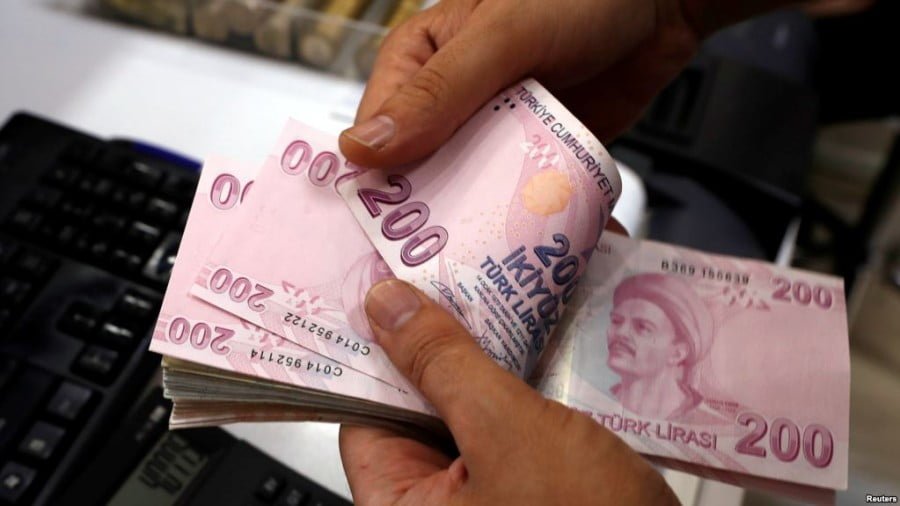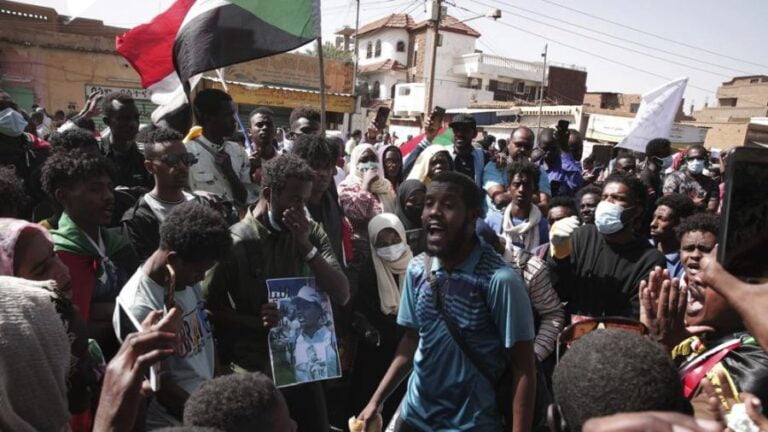How Turkey’s Currency Crisis Came to Pass
President Erdogan of Turkey often asserts that ‘foreign powers’ (meaning the U.S.) want to bring him down. He says that the ‘interest lobby’ (meaning (Jewish) bankers), wants to damage Turkey. He is somewhat right on both points.
Since last week the Turkish lira is on an extended down-slide. Today alone it lost nearly 20% of its value. It will likely take the Turkish economy with it and Erdogan need someone to blame for it.
But while foreign powers and banks surely use the crisis for their own aims, it its Erdogan’s economic policy that is foremost to blame. The long boom he created with borrowed foreign money is finally turning into a bust.
Here is a recap of how it came to this.
The larger political picture:
During the U.S. induced ‘Arab Spring’ U.S. President Obama joined with Qatar and Turkey in an attempt to install Muslim Brotherhood governments throughout the Middle East. When Hillary Clinton left the position of Secretary of State and John Kerry took over, the Obama administration changed its position. It endorsed the coup against the elected Egyptian President Morsi and it refrained from actively using the U.S. military to bring the Syrian government down.
Especially with regards to Syria Turkey was left holding the bag. Erdogan had bet on the U.S. plan to overthrow the Syrian government. His invitation of Syrian refugees and support of radical Islamists fighting in Syria had cost a significant amount of money and brought a lot of trouble with it. The Turkish trade route through Syria to the Gulf countries was closed. Economic relations with Iran suffered. Erdogan needed to get something out of it.
But U.S. policies had turned against him. The Gezi protests in 2013 had all the signs of a U.S. color revolution attempt. They failed. In 2014 the Obama administration began to support the Kurdish PKK/YPG forces in Kobane, east Syria. The PKK is a terrorist organization which tries to create its own country in the eastern part of Turkey, north Syria and north Iraq. The U.S. alliance with and arming of the Kurds created a PKK/YPG dagger pointed at Turkey’s underbelly.
In response to a Turkish led attack on Latakia and Idleb in mid 2015 Russia deployed its forces to Syria. In hindsight it was the point where Erdogan’s game in Syria was over. The U.S. would not launch a war against the nuclear armed Russia. Syria would not fall. But Erdogan played on.
In November 2015 the Turkish air defense ambushed and shot down a Russian jet. Russia responded with a total stop of all economic exchanges with Turkey. These were not the needle prick sanctions the U.S. often uses, but a total abrupt end of all trade relations including millions of Russian tourist visits in Turkey. The economic damage for Turkey was huge. Erdogan had to submit to Russia. Putin was gracious and allowed Erdogan to save his face. The Russian government offered a lucrative pipeline deal and other sweeteners. In mid 2016 the CIA arranged for a hard coup against Erdogan but Russian intelligence warned Erdogan and the coup failed. Turkey is asking the U.S. to hand over Fethullah Gulen which it accuses of instigating the coup. Gulen is a Turkish preacher with a large following and a long time CIA asset who resides in Pennsylvania.
Flipping Turkey from the “western” to the “eastern” camp can be seen as part of Russia’s Black Sea strategy. It is repeat of a mid 19th-century plan executed under Tzar Nicholas I. The current plan is so far successful. But it collides with the U.S. plans to revive NATO for another lucrative Cold War. Thus the current U.S. plan is to use Turkey’s economy problems to finally bring Erdogan down.
The larger economic picture:
Outside of his country Erdogan is much disliked. His arrogance and autocratic style do not leave a good impression. But within Turkey he had a very successful career and continues to be supported by a majority of his people. The reason behind this is the long economic boom he created.
In 2002, when Erdogan became prime minister, Turkey was recovering from a recession. Erdogan’s predecessor Kemal Derviş had implemented some significant reforms. Erdogan took credit for the results. He additionally discarded a number of cumbersome regulations and cleaned up the bureaucracy. He invited foreign investment. The program worked well. The economy grew at a fast pace and many Turks were pulled from poverty. A few became rich. The early years of economic success under his rule are remembered well. Inflation was steady at a relatively low rate even while money was freely available and the economy grew. But Erdogan’s expansive economic program also made Turkey more vulnerable.
Turkey has a chronic current account deficit. It imports more goods and services than it exports and has to borrow foreign money to pay for the difference. In the early Erdogan years a lot of money flowed into Turkey. But it was invested in unproductive matters. New housing expanded a booming Istanbul. New splendid bridges and airports, lots of shopping malls and more than 10,000 new mosques were build as well as a 1,000 room palace for Erdogan to use. His cronies in the building industry got very rich.
But productive industries that create products to export to other markets are harder to build than mosques. Erdogan never made them a priority. Thus Turkey’s current account deficits grew from 1% of its GDP to about 6% of GDP. This was clearly unsustainable.
During the boom the Turkish central bank interests rates came down from earlier heights but were still kept higher than elsewhere. The industries and banks borrowed in euros or dollars which carried less interests but this also meant that they took on a high currency risk. If the Turkish lira was to fall the loans would have to be paid back in hard currencies from revenue made in a diminishing lira.
Under normal circumstances Turkey’s central bank would have engineered one or more mild recession during the 16 year long boom. Some of the accumulated waste and bad loans would have been discarded. Consumption of foreign goods and the current account deficit would have come down. But Erdogan has a curious understanding of economic theory. He believes that high interest rates cause inflation.
Every time the Turkish central bank increased its interest rate to keep inflation in check and to stop the lira from falling Erdogan found harsh words against it and threatened its independence. The relatively cheap money kept flowing, the Erdogan boom kept going, but the structural problems became worse.
Since early 2017 inflation in Turkey picked up. It since increased from 8% to now 15%. The currency went down. The value of 1 lira fell from US $0.30 in 2016 to US $0.20 a week ago. During the last few days it crashed another 25% to US $0.15. It now takes more than 2,000 lira to pay back the principal of a 1,000 lira loan taken out in U.S. dollars in 2016. The Turkish industries and banks have borrowed some $150 billion in foreign currencies. Only those who export most of their products in hard currencies will be able to pay back their loans. The others are practically bankrupt.
The bill for the long boom is coming through. The Turkish lira is crashing. No foreigners want to loan Turkey more money. For taking such a high risk they demand extremely hight interest. Turkey will soon be unable to pay for its imports, especially for the hydrocarbon energy it needs. Unfriendly relations with the United States will make it difficult to ask the International Monetary Fund (IMF) for an emergency loan. It would come with very harsh conditions such as demands to ‘reform’, i.e. end, the benefits Erdogan has channeled to his followers.
The current escalation:
The escalation of the currency crisis during the last week coincided with the escalation of a minor conflict with the United States.
After the 2016 coup attempt Turkey imprisoned U.S. pastor Andrew Brunson, who had long worked in the country, and charged him with terrorism. Last week a deal was arranged to exchange Brunson for a Turkish person held in Israel on terrorism charges. Turkey had expected more from the deal. It wants to free Mehmet Hakan Atilla, a Turkish banker, who the U.S. imprisoned for having breached U.S. sanctions on Iran. (He indeed did so by arranging a gold for oil trade with Iran. A trade from which Turkey, and especially Erdogan’s immediate family, profited.)
Last week the U.S. side says that Erdogan went back on the exchange deal:
The deal was a carom shot, personally sealed by Trump, to trade a Turkish citizen imprisoned on terrorism charges in Israel for Brunson’s release. But it apparently fell apart on Wednesday, when a Turkish court, rather than sending the pastor home, ordered that he be transferred to house arrest while his trial continues.
Trump and the evangelical vice president Pence went berserk:
Thursday morning, after a rancorous phone call with Erdogan, Trump struck back. The United States “will impose large sanctions” on Turkey, he tweeted. “This innocent man of faith should be released immediately.”
Vice President Pence chimed in, saying in a speech at a religious conference that Turkey must free Brunson now “or be prepared to face the consequences.” Secretary of State Mike Pompeo called his counterpart in Ankara.
The U.S. went on to sanction two cabinet ministers of its long time NATO ally. But Erdogan would not give in. The markets reacted to the public sanctions and counter-sanctions threats. The lira began to crash from 4.80 lira per dollar to 5.20 per dollar. On Wednesday a Turkish delegation traveled to Washington to further negotiate the issue but the talks failed. The lira went to 5.50 per dollar. The financial markets became alarmed. The fall out of the spat threatens to impact European banks.
This morning Erdogan held a speech in which he dismissed fears of a lira crash:
“There are various campaigns being carried out. Don’t heed them,” Erdogan said.
“Don’t forget, if they have their dollars, we have our people, our God. We are working hard. Look at what we were 16 years ago and look at us now,” he said.
Erdogan said he would not “surrender to economic hitmen”. The banks which have loaned a lot of money to Turkey might understand that as a threat to default on Turkey’s debt.
At noon the lira was falling minute by minute at a 20% per day rate. Erdogan’s son in law Berat Albayrak, who was recently made finance minister, held a planned speech on the economy. He was expected to give some numbers on the deficits and to name some concrete measures the government would take to end the lira problem. But he refrained from doing so. He tried to calm the markets by claiming that the Turkish central bank is independent and would act as necessary. No one believes that the central bank in Turkey can act without Erdogan’s approval. Erdogan is a self-declared enemy of high interests and the central bank did not intervene today when it was urgently needed.
In the mid of Albayrack’s speech Donald Trump personally intervened via Twitter:
https://twitter.com/realDonaldTrump/status/1027899286586109955
Steel is one of Turkey’s biggest export products. The U.S. imports $1+ billion worth of Turkish steel per year. The White House later said the these tariffs are tied to security, not to trade.
Meanwhile Erdogan held a phone call with the Russia’s President Putin to “discuss the economic ties”. He may have asked for an emergency loan.
Meanwhile the lira dropped to 6.80 for a dollar.
Erdogan then gave another speech in which he lambasted the U.S. pressure without naming Trump or mentioning his tweet.
At the end of the day the lira stood at 6.50 to the dollar after 5.50 yesterday. Turkish stocks were down some 2%. Stocks of some Turkish banks and steel producers fell 15%. Spanish, Italian and French banks, which lent tens of billion Euros to Turkish banks, also lost. Bloomberg documented today’s tic-toc in a live blog.
Where from here:
Erdogan now has the weekend to discuss the issue with his advisors. If no measures are taken by Monday morning, today’s crash will gain pace. The lira will fall further. The central bank will have to raise interest raise to 30+% to stop the slide and to attract urgently needed foreign money. The Turkish economy will go into a deep recessions. A number of its banks and companies will go bankrupt. Unemployment will rise.
Erdogan will blame the U.S. and the “interest rate lobby” for the downfall. His followers will believe him. Any hope that Erdogan will go over this is in vain.
But Turkey’s problems are structural. The burst of its bubble was long expected. Its foreign account deficit is simply unsustainable. It will have to cut back on imports and boost its exports. It will need large emergency loans.
Yes, the U.S. is using the issue to put pressure on Turkey. But the U.S. is not the root cause of the problem. It only exposes it.
The U.S. pressure is not about Turkey’s economy and not even about pastor Brunson. The pressure is, and has been since 2013, to bring Erdogan in line with the U.S. agenda. He will have to stop his good relations with Russia. He will have to stop his purchase of the Russian S-400 air defense system. He may be ordered to stop the Russian pipeline. He must follow the U.S. lead on Syria. As long as he does not do so the U.S. will try everything to bring him down.
The only chance Turkey has to escape from U.S. demands is to further ally with Russia. Putin knows that Erdogan needs him. He will play for time to increase the pressure and then make his own demands. Erdogan will have to give up completely on his plans for Syria. All Syrian land Turkey or its proxies hold must be put back under Syrian government control. Only then will the Turkey’s trade route to the Gulf states reopen. Only then will Russia (and Iran) help Turkey though its crises.
On Monday Russia’s foreign minister Lavrov will visit Turkey.
Will Erdogan accept the Russian demands or will he flip back to the U.S. side and surrender to Trump and the IMF? Or will he find a different way to escape from this calamity?
Update (Aug 11, 8:45 utc):
Erdogan has an op-ed in today’s New York Times. He reminds of the decades of good relations, lists his charges against recent U.S. action and blames it for the deteriorating relations. It culminates in this:
At a time when evil continues to lurk around the world, unilateral actions against Turkey by the United States, our ally of decades, will only serve to undermine American interests and security. Before it is too late, Washington must give up the misguided notion that our relationship can be asymmetrical and come to terms with the fact that Turkey has alternatives.Failure to reverse this trend of unilateralism and disrespect will require us to start looking for new friends and allies.







